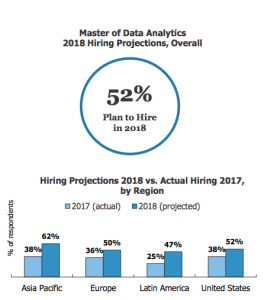What jobs can I get with a business analytics degree?
![]()
We live in the data-age. Most companies are generating, collecting and storing troves of information that can be used to drive business value. Hidden in the data-stores of many companies are insights that can help reach target audiences, increase sales, streamline operations and find opportunities for new products or services. As the data piles up, so does the demand for professionals skilled in business analytics. “Data Scientist” has been Glassdoor’s number one job in America for the last three years in a row, with a median base salary of $110,000.

Source: GMAC Corporate Recruiters Survey Report 2018
The Graduate Management Admission Council’s annual report of corporate recruiting trends states that about half of global companies planned to hire master of science in business analytics (MSBA) talent in 2018. This fast-growing career path has applications in every industry and in companies of all sizes. In fact, four in five companies in the Fortune Global 100 planned to hire people with data analytics master’s degrees this year.
With all of this growth and demand, there are many opportunities for people with an MSBA degree. The job descriptions and titles vary, but we provide a high-level summary here.
1. Business Analyst
Alias: Data Architect, Data Scientist and Data Analyst
A business analyst is an interdisciplinary guru knowledgeable in computer science and statistics. They mine and analyze data to reach valuable business insights. Business analysts are primarily interested in strategic planning (forecasting changing company needs), assessing business models, optimizing workflows and systems analysis. Responsibilities include:
- Database management (aggregating, cleaning up and organizing data sets)
- Building statistical models explaining the interactions of various variables to help companies make projections about future conditions
- Asking and answering questions of large data sets
- Creating data visualizations that tell clear, usable stories about what new insights and how that information can be applied
2. Quantitative Analyst
Alias: Quantitative Modeler, Financial Analyst
A quantitative analyst usually works in finance to help assess risk and generate profits through trading strategies. They design and use mathematical models that allow financial firms to price and trade securities. Skills and an aptitude for mathematical finance, probability, stochastic calculus, statistics and machine learning are cornerstones of a career as a quantitative analyst.
3. Operations Research Analyst
Alias: Business Operations Analyst, Operations Analyst, Operations Business Analyst
An operations research analyst uses data mining, optimization, modeling and statistical analysis to help organizations run more efficiently and economically. They look for ways to minimize waste, streamline operations processes and optimize sourcing models. A good example is how USPS uses operations research to track packages in order to provide real-time guidance to delivery personnel to help manage distribution.
4. Market Research Analyst
Market research analysts study market conditions to understand the potential of a new product or service or to optimize its impact/revenue. They research and forecast market trends, measure the success of marketing programs, do detailed analyses to identify target markets and look for opportunities to reach them. They also help to identify a company’s position in the market place by completing rigorous competitive analysis.
Need help sorting through the variety of business analytics titles?
Every company and every industry has different views and specific needs for their analysts. Two jobs with the same title can be completely different, so it’s important to have transparent discussions with potential employers to get a full understanding of duties and requirements. UW Foster Business School students in the Master of Science in Business Analytics program have access to the Foster Career Services center, which provides our MSBA students with career resources and individual career coaching tailored to students’ specific career goals. Their dedicated team of coaching professionals gives students the opportunity to learn critical job search skills and connect with industry professionals to further their career path.
As this field continues to grow, there certainly won’t be a shortage of choices. MSBA has partnerships with industry leaders from Seattle’s business giants and is engaged in a strategic expansion of our partner network. Leverage Foster’s connections to Seattle’s business community to accelerate your career in this rapidly growing field.
Ready to jump in to a career in business analytics? Check out the UW Foster School of Business Master of Science in Business Analytics.
Written by Victoria Pinheiro, MSc.
MSBA Content Strategy Writer
[email protected]
